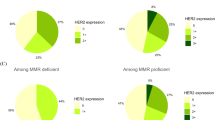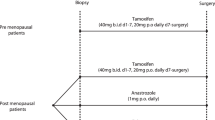Abstract
Several oncogenes and tumour-suppressor genes have been identified that may have an important role in the development of human breast carcinoma. Furthermore, some of these gene alterations may be linked to the development of invasion and subsequent metastasis. Alterations in the expression of ras p21, p53 and c-erbB-2 have all been linked to tumours with rapid cellular proliferation, but the evidence that they are of prognostic importance in patients with breast cancer is conflicting. This study explores the relationship between expression of these oncoproteins and clinical outcome in 92 patients with either locally advanced or metastatic breast cancer treated with primary endocrine therapy. Specimens of the primary carcinoma were available for analysis of hormone receptor, Ki67 labelling index, epidermal growth factor receptor (EGFR), c-erbB-2, p53 and ras p21. Clinical response was measured according to UICC criteria after 6 months of treatment and all patients were followed for time to progression and overall survival. As shown previously, oestrogen receptor (ER) negativity, high Ki67 labelling index and EGFR overexpression were associated with a shorter time to progression and overall survival. However, no statistically significant relationship existed between expression of ras p21, p53 or c-erbB-2 and response to treatment, time to progression or overall survival. We conclude that staining for these three oncoproteins has no role in therapeutic decision-making in patients with advanced breast cancer. The negative finding implies that while abnormal expression of these genes may have an important role in the development of breast cancer, the variations in growth characteristics of advanced breast cancer may be influenced by other factors.
This is a preview of subscription content, access via your institution
Access options
Subscribe to this journal
Receive 24 print issues and online access
$259.00 per year
only $10.79 per issue
Buy this article
- Purchase on Springer Link
- Instant access to full article PDF
Prices may be subject to local taxes which are calculated during checkout
Similar content being viewed by others
Author information
Authors and Affiliations
Rights and permissions
About this article
Cite this article
Archer, S., Eliopoulos, A., Spandidos, D. et al. Expression of ras p21, p53 and c-erbB-2 in advanced breast cancer and response to first line hormonal therapy. Br J Cancer 72, 1259–1266 (1995). https://doi.org/10.1038/bjc.1995.497
Issue Date:
DOI: https://doi.org/10.1038/bjc.1995.497
This article is cited by
-
Methods for Estimating Long-Term Outcomes for Trastuzumab Deruxtecan in HER2-Positive Unresectable or Metastatic Breast Cancer After Two or More Anti-HER2 Therapies
Targeted Oncology (2022)
-
Elevated serum RAS p21 is an independent prognostic factor in metastatic breast cancer
BMC Cancer (2018)
-
Biomarkers of Therapeutic Resistance in Breast Cancer
Current Breast Cancer Reports (2013)
-
Overexpression of p53 is correlated with poor outcome in premenopausal women with breast cancer treated with tamoxifen after chemotherapy
Breast Cancer Research and Treatment (2010)
-
Evaluation of Ki-67 proliferation and apoptotic index before, during and after neoadjuvant chemotherapy for primary breast cancer
Breast Cancer Research (2006)



